Brajkovic putting bad luck with Astana behind him at UnitedHealthcare
Slovenian excited for American races with new team
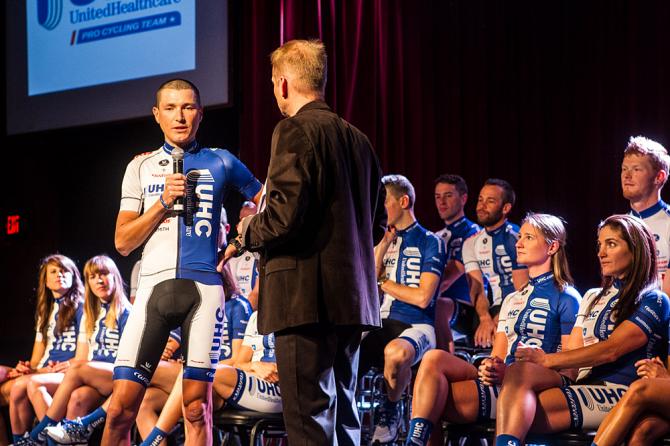
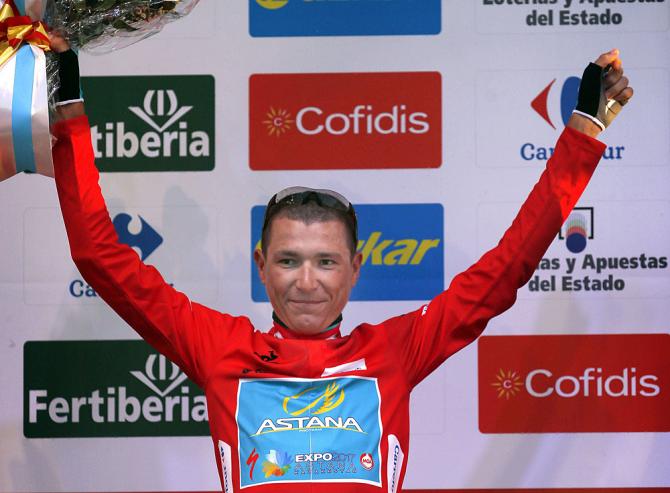
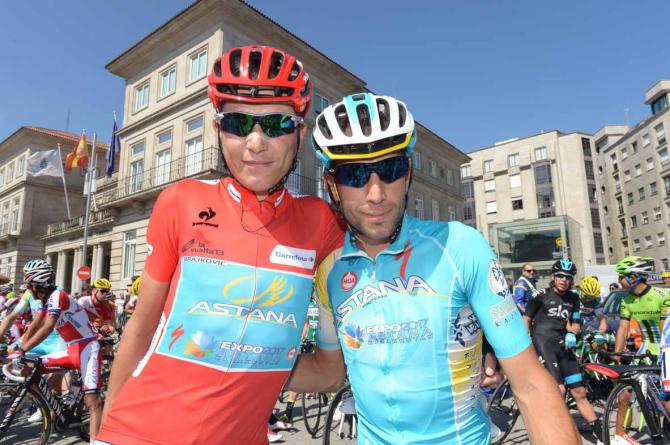
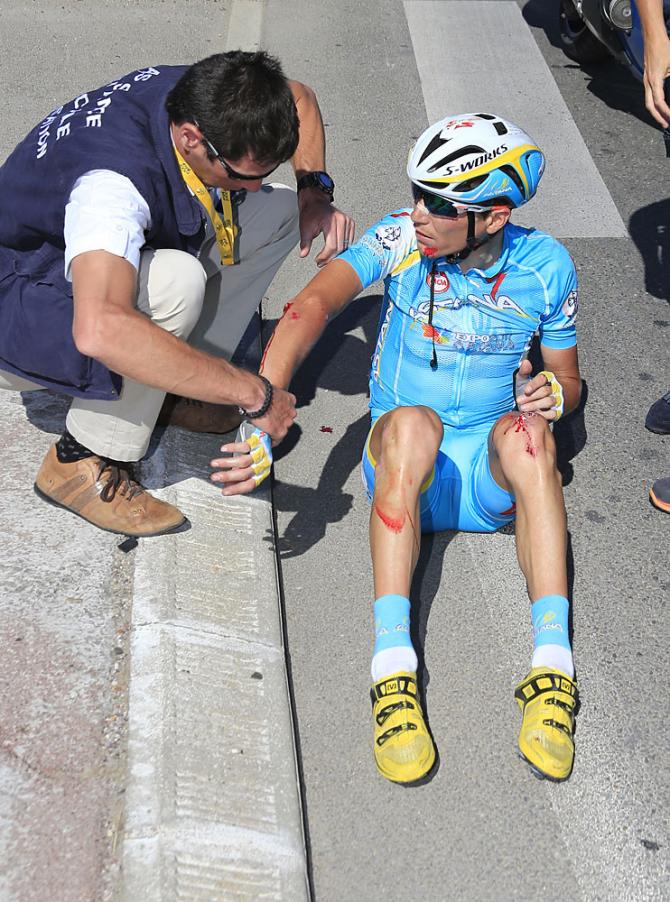
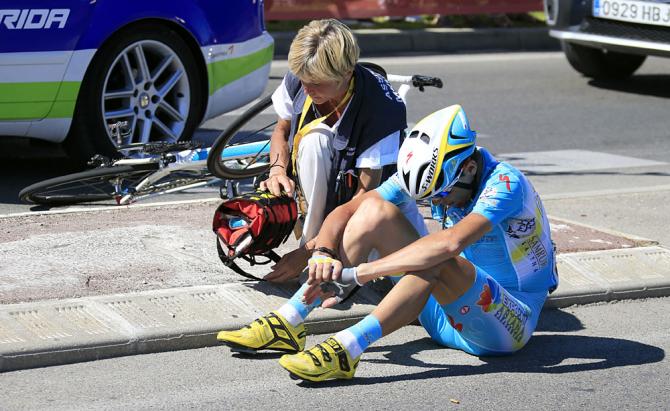
The biggest victory of Janez Brajkovic's career came at the 2010 Critérium du Dauphiné, where he won the overall ahead of Alberto Contador, but since then he has run up against bad luck and injuries and has not been able to capitalize on that promise. After spending three unsatisfying seasons on a fractured Astana squad, the Slovenian signed for 2015 with UnitedHealthcare. After only a few days with the American team in Asheville, North Carolina he already feels at home and more optimistic about the future.
"I've had three tough years," Brajkovic told Cyclingnews at his first camp with UnitedHealthcare, contrasting the new team against his soon-to-be former Astana squad.
"Here it's totally different [from Astana]. You can talk to everyone. We all speak English. It's so much easier. There, you had Kazakh group, Italian group, and then all the rest. It was very difficult to communicate with those guys. Especially Kazakh group. It was a closed group. They talked their own language. You could not interact because you don't understand. We were teammates but we weren't best buddies.
"Here, it's totally different. I've been here for four days, and there are a lot of new faces. The whole team - most of the team, the staff, and directors I've never talked to before, but in the past few days I feel like I've been part of the team for a year or more already.
"So far I've really liked it. It's a very good sign - I'm happy again, that's the most important thing."
Brajkovic is no stranger to racing in the USA on an American team. At 21, he signed onto the Discovery Channel team on the day that Lance Armstrong won his final (now disqualified) Tour de France. Brajkovic spent six years under Johan Bruyneel until Team RadioShack merged with Leopard Trek ahead of the 2012 season, then he left for Astana with the promise of being a co-captain with Roman Kreuziger - one which never quite worked out.
Racing through the pain of a late race crash, Brajkovic came ninth in the 2012 Tour de France behind winner Bradley Wiggins, but the next year he was relegated to the role of helper for new hires Vincenzo Nibali and Jakob Fuglsang. His Grand Tours continued to be riddled with misfortune. He crashed out of the Tour in 2013 with a gash in his knee before coming back to briefly lead the Vuelta a España and help Nibali to second place. This year it was a broken elbow in the Giro d'Italia that ruined his season.
The latest race content, interviews, features, reviews and expert buying guides, direct to your inbox!
Brajkovic is hoping that a lighter racing schedule and a team with a new attitude and a strong family atmosphere will help turn around his career, which in the past several years has been riddled with illness, injury and lacking much enjoyment.
"I think once you have a little bad luck, and you're not feeling well on a team, or in the group, in the back of your mind you're very pessimistic about everything. I think it comes and haunts you. You think 'I'll crash, maybe I'll crash', then you crash. You sort of look for it. I think this is over now. We'll have a good 2015."
Astana did not extend Brajkovic an offer for a contract for 2015, but considering the Kazakhstani team has come under intense scrutiny over its contentious WorldTour licence as well as the report out of Padova, Italy into the team's links with banned physiologist Dr. Michele Ferrari, he dodged a bullet signing for UnitedHealthcare instead.
"It's hard to say anything [about Astana's situation]," Brajkovic said, clarifying that he is still under contract with the team until December 31. "I feel sorry for some guys on the team, because I know ... I'm never going to put a hand in the fire for them, but I know they're good guys and they follow the rules. I guess there are also some guys that should maybe leave the sport. It would be better for everybody," he said, refusing to name anyone specifically.
"This whole thing is behind me. I don't want to go back. This team," he said, thumping the table with his finger for emphasis "is present and future for me. I'm going to focus on positive things and on this team, on getting results for UnitedHealthcare team."
Of Astana, he said, "I'm not going to really think about it a lot. I think there are people in cycling that are deciding what to do, what not to do, how to sanction them. My job here is to deliver for this team now. I'm going to focus on this."

Brajkovic wore the Vuelta leader's jersey after the team time trial, and passed it on to teammate Vincenzo Nibali. Photo: Sirotti
Missing America
Since leaving Radioshack, Brajkovic described his time with Astana as one of increasing isolation, and he longed to get back to America, but the Kazakh team had little motivation to race here.
"I've been missing it a lot. I tried to get Astana to do Tour of California, USA Pro Challenge or Utah, but that never happened. We did it in 2012, but yeah. With a Kazakh team, they have no interest in racing here. It was really hard. But - I'm on an American team now, so I'll be doing all those races. I'm very excited and happy.
"American culture is much closer to me than European or even Eastern European. People are a lot more open, warmer. You can talk to stranger, no problem. In Europe, people are more - I wouldn't say unfriendly - but they're not so nice. I like it here more."
On UnitedHealthcare, he says his primary goals are in the three big US races, "plus if we get a Grand Tour invitation, that would be huge. Then again, I'd like to have a consistent season with a lot of success. I know it's not possible to be good for 10 months, but I would like to be a player everywhere."
After spending 10 seasons in the sport's top tier, Brajkovic doesn't see moving to a Pro Continental team as a step back, rather as an opportunity to regain momentum after years of racing a schedule that was too packed to recover from any illness or injury, which can lead to a long, gradual downward spiral.
"With a ProTour team (sic), it's hard. Once you start racing, there's not a lot of time to recover. When you get sick, you just go down. You don't get better. You go from bad to worse to overtrained to sick, then you have to take a month of rest, and often that's not possible in these big teams."
His 2014 season was one of those years. Brajkovic was selected to race the Giro d'Italia in support of the team's leaders Michele Scarponi and Fabio Aru, but on stage 6 to Montecassino a rain-slicked roundabout 15km from the finish and a peloton hammering in at 75kph left him on the ground, the bone just below his elbow broken in two and twisted around, rapidly swelling and cutting off sensation in his hand.
"It was not an innocent thing," Brajkovic said. "I had to lay in a backroom in the hospital for five hours, I didn't get any pain killers or anything. I was the first one to the hospital and the last one to leave. They put a cast on it, but the elbow wasn't finished swelling. The next day I went to the hospital in Slovenia and they took off the cast, and the arm was triple the size. I had to wait six days to have surgery. After that it got better and better, but still - I hit a nerve in the crash, so I have no feeling here," he said, pointing to his left pinky finger. "It's getting better, so hopefully in a year it will be OK. It doesn't bother me a lot."
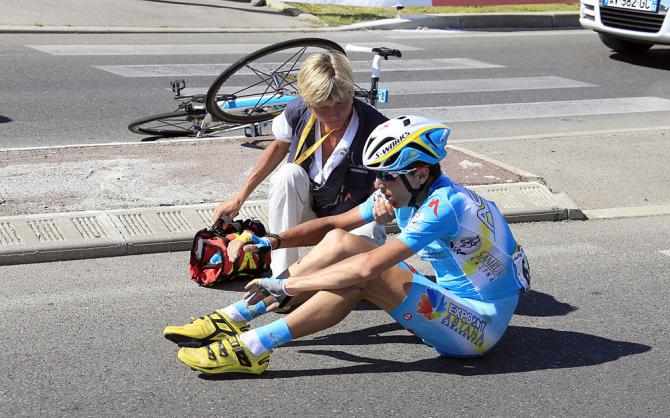
Brajkovic crashed out of the 2013 Tour de France with a deep wound to his knee. Photo: Bettini
Brajkovic was out for six weeks before returning for the Slovenian national championships, and then raced the Tour of Austria in July, but said he was still in pain.
"Then I did [the Vuelta a] Burgos [in August], and got third there, I didn't do the Vuelta, so the season was over for me. I was hoping to do well at the Tour of Beijing. I did two weeks training in Gran Canaria, and I was feeling very good then the Iglinsky thing happened and the season was over. After that, in the end it turned out very well for me. I signed for UnitedHealthcare and for me, I couldn't wish for anything better."
On UnitedHealthcare, Brajkovic sees a podium place at one of the three major US races as a realistic goal. "[Americans] set their goals really high so I'll do the same," he said. "It's optimistic, but realistic as well to shoot for the podium. I think we can do it. I'm sure I'm capable of doing that, and I'm sure the team we have is as good as any other team out there."
In those races, he will have to go up against his former teammate and good friend Chris Horner, but Brajkovic thinks he can get the better of the 2013 Vuelta champion.
"I think he'll be super strong, for sure. I can time trial better than him, so this is where I can probably beat him. He can climb, but so can I. I think if I have the condition I had this year at the Giro, or last year at the Tour - I crashed out of both races - there's no worries."
Regardless of racing goals, Brajkovic said he just wants to have a consistent year, and feels confident his new team will make achieving that goal easier. "I'm sure we'll have problems, and not everything will go as planned. There will be ups and downs, and crashes and injuries, and bad weather, but if you have a group of guys that get along really well and work together as a team, and are a family, it's so much easier to get through the bad times. So much easier."
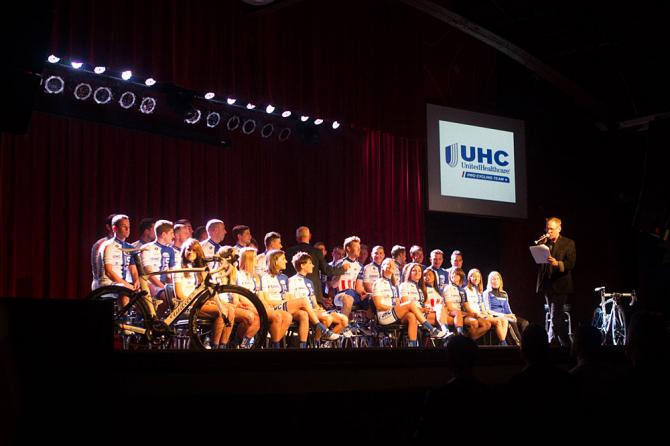
The 2015 Unitedhealthcare team presented in Asheville, North Carolina. Photo: Jonathan Devich

Laura Weislo has been with Cyclingnews since 2006 after making a switch from a career in science. As Managing Editor, she coordinates coverage for North American events and global news. As former elite-level road racer who dabbled in cyclo-cross and track, Laura has a passion for all three disciplines. When not working she likes to go camping and explore lesser traveled roads, paths and gravel tracks. Laura specialises in covering doping, anti-doping, UCI governance and performing data analysis.